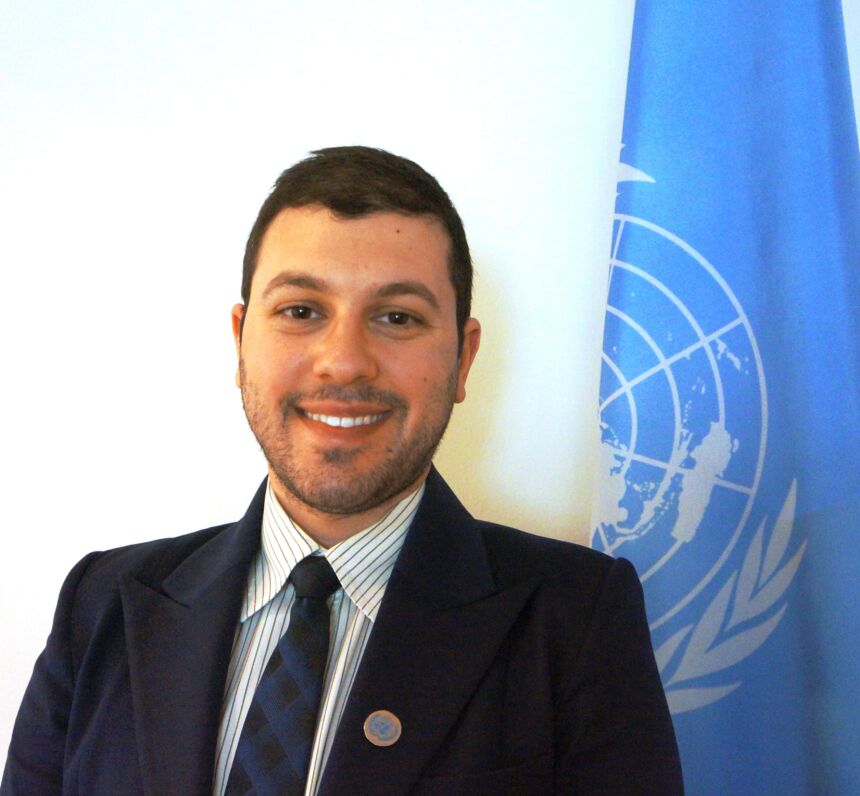November 21, 2014
SIA grad and United Nations public information assistant talks to students about careers at the U.N.

“I’ve met many heads of state, government officials from all over the world, and even took a selfie with President Obama.”
After getting his audience’s attention, Said Maalouf, School of International Affairs alumnus and public information assistant at the United Nations, clarified his statement:
“Well, Obama was behind me, and I took the photo.”
Maalouf returned to SIA, after graduating spring of 2013 to speak about career opportunities at the U.N.. He first gave an overview of the U.N., and some of its history while scrolling through projected images of U.N. meeting rooms.
“I could go on forever,” he said. “But I know what is interesting to you is how do you get a job.”
He stressed the importance of language skills, especially Arabic and other uncommon languages such as Chinese, Persian, Russian, Swalhili, and Urduand. Language skills, other than French and Spanish, give applicants an edge over others, he said.
Maalouf also emphasized the importance of the coursework at SIA, specifically its focus on practical skills in addition to theory and textbook learning. From the Quantitative Analysis class with Professor Johannes Fedderke, to the Global Cultures and Leadership class with Professor Sophia McClennen, his classroom experience helps him on a daily basis in his job at the U.N.
“The professional nature of the SIA program shaped my experience, as I learned extensive presentation techniques and skills to clearly present ideas in a cohesive and concise manner,” he said.
One of his most memorable lessons was “the elevator talk” assignment in Professor Dennis Jett’s class.
“You bump into the secretary of the U.N. or another head of state in an elevator and have 30 seconds to present your idea,” he explained. “You have to pitch it and convince them of the idea.”
While he hasn’t been in an elevator with U.N. Secretary General Ban Ki-moon yet, he said he makes oral presentations on a weekly basis, where he has to use statistics and analysis to support his points.
Maalouf began his U.N. career as an intern, but a U.N. internship is not required to apply for a job. Candidates can apply to be a U.N. staff member, a U.N. volunteer, or apply to the internship program. For an internship, applicants need to be enrolled in a master’s degree program, and, if necessary have a travel visa and arrange and cover the costs of travel, accommodations, and living expenses for the term of the internship. Candidates must also communicate fluently in English. U.N. internships are available in most departments in all offices.
Maalouf, who interned at the U.N. during the summer between his first and second years at SIA, added that interns cannot be hired for a job at the U.N. until 6 months following the end of the internship.
“I got lucky, but I also had to work hard for this job,” he said. “You don’t have to do a U.N. internship to get a job, but I highly recommend an internship if you are interested in the U.N., as it gives you experience and skills, but also gives you the opportunity to network and get to know people.”
The U.N. also hires professional employees, positions which require two years of work experience and master’s degree, and has a volunteer program, usually focusing on development projects in other countries. Applicants hired as a professional employee must be prepared to go wherever they are assigned. For specific applicant requirements, Maalouf directed interested students to the U.N. website.
While a student at SIA, Maalouf met with Career Services extensively to help him redraft his resume and learn networking skills. He also mentioned the value of the annual trip to Washington, D.C., organized by Career Services, where students meet with potential employers.
“My experience showed me the importance of networking and connections, as well as the lifelong friendships with students and faculty I’ve made here,” he said.
